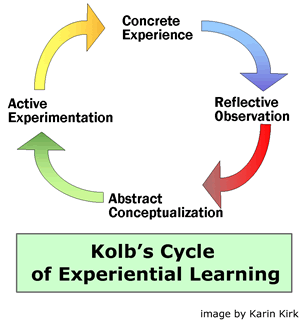EXPERIENCED BASES SYSTEM LEARNING
Learning Styles and Learning Spaces: A Review of the Multidisciplinary Application of Experiential Learning Theory in Higher Education
Alice Y. Kolb Experience Based Learning Systems Inc. , David A. Kolb Case Western Reserve University
Working Paper 5/05, Department of Organizational Behavior, Weatherhead School of Management, Case Western Reserve University. A revised version of this paper will appear in Sims, R., and Sims, S. (Eds).(2006). Learning styles and learning: A key to meeting the accountability demands in education. Nova Publishers. Not to be quoted or cited prior to publication.
(PDF) Learning styles and learning spaces: A review of the … ( <– https://www.researchgate.net/publication/291046218_Learning_styles_ and_learning_spaces_A_review_of_the_multidisciplinary_application_of_experiential_learning_theory_in_higher_education)
Using the concept of learning style and learning space to describe the interface between learners and the learning environment in higher education, in this chapter we review studies addressing how learning style information and the experiential learning model have been applied to improve teaching and learning in sixteen different academic fields and professions. Studies suggest that experiential learning affords educators a way to design and implement teaching and learning strategies conducive to creating a learning environment beneficial for both faculty and students with possibilities for institutional wide dissemination of its core principles and practices. Drawing from the findings generated from the studies, we propose guiding principles for creating growth promoting learning spaces throughout higher education. The Experiential Learning Cycle
Kolb’s experiential learning style theory is typically represented by a four-stage learning cycle in which the learner ‘touches all the bases’: Kolb states that learning involves the acquisition of abstract concepts that can be applied flexibly in a range of situations. In Kolb’s theory, the impetus for the development of new concepts is provided by new experiences.“Learning is the process whereby knowledge is created through the transformation of experience”

DEVI AKELLA
Learning together: Kolb’s experiential theory and its application
College of Business, Albany State University, Albany GA, USA Journal of Management & Organization (2010) 16: 100–112.
https://www.researchgate.net › 24
This paper aims to make a limited contribution to Kolb’s Experiential Learning Theory. An evaluation has been made of an empirically based personal narrative of the author’s experiences, reflections and problems as an instructor of a management elective course at the undergraduate level. The paper examines the process of reflection, correction and learning from the perspective of the instructor and how the issue of race and origin of the student learners’ can stimulate or hinder assimilation of knowledge within a classroom. The study reveals that it is essential for an educator to be critically reflective of his/her culture and that of his/her students to be able to assess their learning styles and adopt suitable and appropriate teaching pedagogies within the classroom. This paper draws attention towards types of teaching pedagogies, non traditional methods and aids and their effectiveness in educating students of diverse backgrounds. It provides insights about diversity within classrooms and its impact on teaching, pedagogies and learning styles of both educators and students, by portraying the journey of an educator and her process of self improvement.
The function of corporeality in the development of knowledge
Francesco Lo Presti
Università degli Studi di Napoli “Parthenope”
francesco.lopresti@uniparthenope.it
https://ojs.pensamultimedia.it/index.php/siref/article/view/1877
The paper aims to highlight the role assumed from corporeality in shaping Self and learning processes and, therefore, the function that it can assume as an interpretive category that models training processes, focusing on use of body and movement as viaticum of knowledge.
Specifically, it will be presented a perspective that, describing and integrating cognitive, socio-constructivist and culturalist approaches, constitutes a significant background to define the notions of body-in-relation and movement in a complex and multidimensional pedagogical perspective. Starting from this theoretical background take moves some basic guidelines for planning and implementing didactics thought as innovative ways that legitimize the use of physical education as a privileged strategy to improve tout court the quality of learning and training processes.
The Sense of Initiative and Entrepreneurship.
The Formation of an Intercultural Competence in Pre-adolescents
Barbara Baschiera, University of Malta,
barbara.baschiera@um.edu.mt
Fiorino Tessaro, Università Ca’ Foscari, Venezia,
tessaro@unive.it
Among the eight key competences in Europe, the “sense of initiative and entrepreneurship” is the least aimed at the secondary school level and the one young Italians develop much less than their immigrant peers.
Our research involves two classes of pre-adolescent students, with a good number of immigrants, which we have divided into working groups. They were asked to face reality, authentic tasks and show ability to deal with real problem solving by adopting cooperative methodologies. The key hypothesis is that intercultural cooperative learning tasks may improve and increase the processes relevant to the six indicators of competence (idea-action translation, creativity, innovation, risk taking, planning,
project management) both for Italian students and non-Italian speakers.
The word “competence” means a mix of knowledge, abilities and attitudes: you are “competent” if you are able to act well in a certain situation. To be competent does not mean solely to know something or to have some notions about some topics, but also to put into practice the knowledge in a given context and situation. The European Union has identified 8 Key Competences that enable every citizen to adapt to changes of society. They are important for the personal fulfillment and development, for the working life, for studying and learning new things. Everyone should possess them: young people in training to get ready for the adult life, adult and senior people for Lifelong Learning in order to continuously improve knowledge.
The 8 Key Competences are the following:
1. Communication in mother tongue
2. Communication in foreign language
3. Mathematical competence and basic competences in science and technology 4. Digital competence
5. Learning to learn
6. Social and civic competence
7. Sense of initiative and entrepreneurship
8. Cultural awareness and expression.
Sense of initiative and entrepreneurship: is the ability to turn ideas into action. It involves creativity, innovation and risk-taking, as well as the ability to plan and manage projects in order to achieve objectives. The individual is aware of the context of his/her work and is able to seize opportunities that arise. It is the foundation for acquiring more specific skills and knowledge needed by those establishing or contributing to social or commercial activity. This should include awareness of ethical values and promote good governance.
Entrepreneurship competence : Entrepreneurship competence refers to the capacity to act upon opportunities and ideas, and to transform them into values for others. It is founded upon creativity, critical thinking and problem solving, taking initiative
and perseverance and the ability to work collaboratively in order to plan and manage projects that are of cultural, social or financial value. Knowledge Entrepreneurship competence requires knowing that there are different contexts and opportunities for turning ideas into action in personal, social and professional activities, and an understanding of how these arise. Individuals should know and understand approaches to planning and management of projects, which include both processes and resources. They should have an understanding of economics and the social and economic opportunities and challenges facing an employer, organisation or society. They should also be aware of ethical principles and challenges of sustainable development and have self-awareness of their own strengths and weaknesses. Skills Entrepreneurial skills are founded on creativity which includes imagination, strategic thinking and problem-solving, and critical and constructive reflection within evolving creative processes and innovation. They include the ability to work both as an individual and collaboratively in teams, to mobilize resources (people and things) and to sustain activity. This includes the ability to make financial decisions relating to cost and value. The ability
to effectively communicate and negotiate with others, and to cope with uncertainty, ambiguity and risk as part of making informed decisions is essential.
Attitudes: An entrepreneurial attitude is characterised by a sense of initiative and agency, pro-activity, being forward-looking, courage and perseverance in achieving objectives. It includes a desire to motivate others and value their ideas, empathy and taking care of people and the world, and accepting responsibility taking ethical approaches throughout the process.
